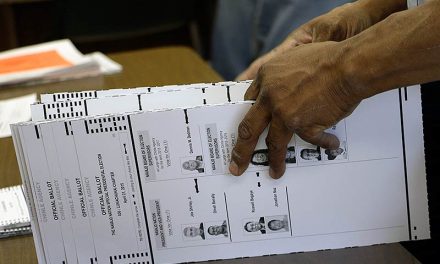
Opinion | Addressing the no physical address issue on the Navajo Nation
Addressing the no physical address issue on the Navajo Nation
By Millicent Michelle Pepion, Ph.D.
Editor’s note: Dr. Millicent Michelle Pepion is a graduate of the American Indian Studies program at the University of Arizona. Her dissertation analyzes the relationship between the 22 tribes and 15 counties in Arizona. For more information about her work, visit RedDataConsulting.com.
Election season is approaching and for many people on the Navajo reservation this means they will have to prove their physical address.
The issue I am speaking with pertains to the fact that in order for your vote to count in districts that overlap your community, you must be able to verify your physical address with your County Recorder and Arizona’s Secretary of State. If you are unable to verify your physical address, you will still be able to vote for state-wide candidates, but your vote for community elected officials will not be counted.
How did I come to care about this work? In 2020, I had the opportunity to live in the Window Rock area with my Uncle Stanley Perry and his wife Judge Carol Perry. Before she passed, they lived in a small allotment, just west of Denny’s on Highway 264. They did not have a physical address and having worked for the Inter-Tribal Council of Arizona, I knew this was going to be a headache to prove in the upcoming Biden-Trump election.
Several factors, which I will not name now, motivated me to want to participate in both the primaries and general election, and that’s how I came to the following three conclusions.
First, I recommend that you push for physical addresses among your chapters. Gila River Indian Community has one post office in Sacaton, Arizona. It is only open from 8 a.m. to 5 p.m., Monday through Friday, excluding holidays.
On percap day, I had the honor of watching my step-dad, Doug Evans, and his family gather at the post office to collect their checks. Even though they do not receive mail at their physical address, my step-dad has a physical address. The street he lives on is named after a sacred mountain that is located at the end of his block, Aji Road.
Navajo Nation chapters can do the same thing. We can create street names and physical addresses for our people, even if we continue the practice of not enforcing the United States Post Office to deliver mail to our houses individually, as they do for residences off the reservation.
And these street names can be named in our traditional, beloved, and sacred Navajo language that represent words, sacred places, and people we cherish to this day. Can you imagine a “Dook’o’oosłííd Road”? Or how about a “Peter MacDonald Way”? I can. With enough effort and drive, we can make it happen ahead of the next election.
Secondly, if you are unable to convince your chapters to name their roads and issue street numbers per allotment or housing unit ahead of the next election, you can do what I did. Create your own street address using identifying markers, and later process that address through the Department of Motor Vehicles.
The address I created went something along the lines of “SW Mile Marker 169 1/2, West Highway 264, Saint Michaels, AZ 86511.”
The Secretary of State uses the example, “House 27, Behind Hopi Tribal Headquarters” (Using Service Arizona: Instructions, Troubleshooting, and Frequently Asked Questions, 2020).
I updated the address at the DMV location in Window Rock, took a new picture, and within 10 days I had an Arizona Driver’s License with my physical address delivered to my Post Office Box. Due to physical address issues, I will never put a PO Box address on my Driver’s License again.
Finally, I would like to take a minute to explain Google Plus codes. Google, being the international invasive corporation that it is, drew a giant grid map around the entire globe. Most people don’t know it, especially those in smaller countries, but Google knows exactly where every house is in the world. For every location known to them through their extensive data system, they have assigned us all to a box within their grid map.
How do you find what box Google stuck you in is relatively easy to find. Simply go to Google Maps. Type in the search bar the nearest city you live by, then scroll to the community you live in. If you have to, zoom in a bit. Click on the house you live in. Keep in mind, most homes (including hogans) are already identified.
Next, you’ll want to click on your home. On the bottom right, you will see a city name and set of longitude and latitude coordinates highlighted in blue. Click on the blue longitude and latitude coordinate. A red pin will appear, and to the left, a box showing that area’s information. Look for the cross made out of 5 blue dots. Next to that cross, or plus sign, is a weird looking equation. That equation is the Google Plus code.
For fun, I looked up the Google Plus code for the store Cool Runnings (MV4W+9G). In this instance, MV is the largest grid box, 4W is a smaller grid box within the MV grid box, and 9G is the smallest grid box created for the MV4W area. If you want to check to make sure that you are using the correct Plus code, in the same search bar where you typed the nearest city you live by, put instead the Google Plus code and the location you want should be identified. If you don’t want to go through Google maps’ search bar, you can also just do a Google search. Mind you, you can do this on your home computer or cell phone. It’s that easy.
The Department of Motor Vehicles, Secretary of State, and County Recorders all accept Google Plus Codes as legitimate addresses. If you go to ServiceArizona.com to update your address using a Google Plus Code, simply put the Google Plus Code (ex: MV4W+9G) into the Residence Address. Then put in the nearest town or city you live by and your zip code.
All in all, it’s important that the Navajo people’s votes are counted in this upcoming election, and we can’t afford to have our votes thrown away due to issues of unproven physical addresses. For this reason, I encourage all Navajo voters to follow up the voting process by checking your ballot. This feature is available for all Arizona residents to use, and it is located on Arizona’s Secretary of State website: azsos.gov.
Good luck this election season, and remember, we must keep Arizona Turquoise!
All the best!








 Highway 264,
Highway 264, I-40, WB @ Winslow
I-40, WB @ Winslow